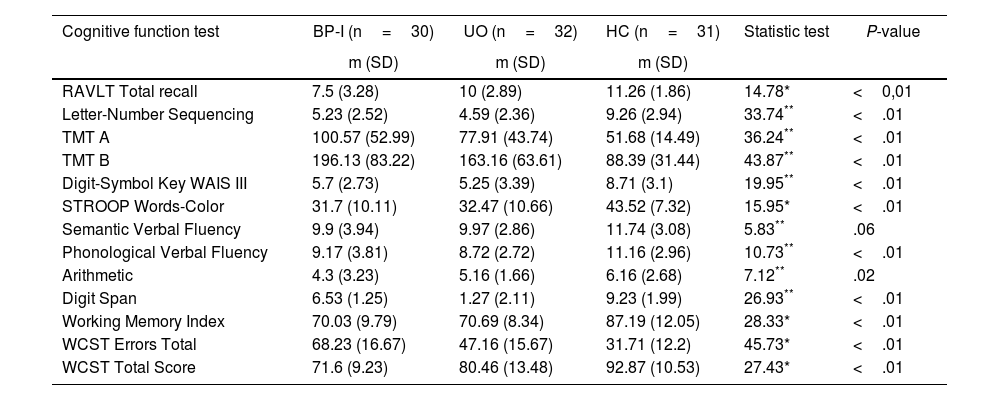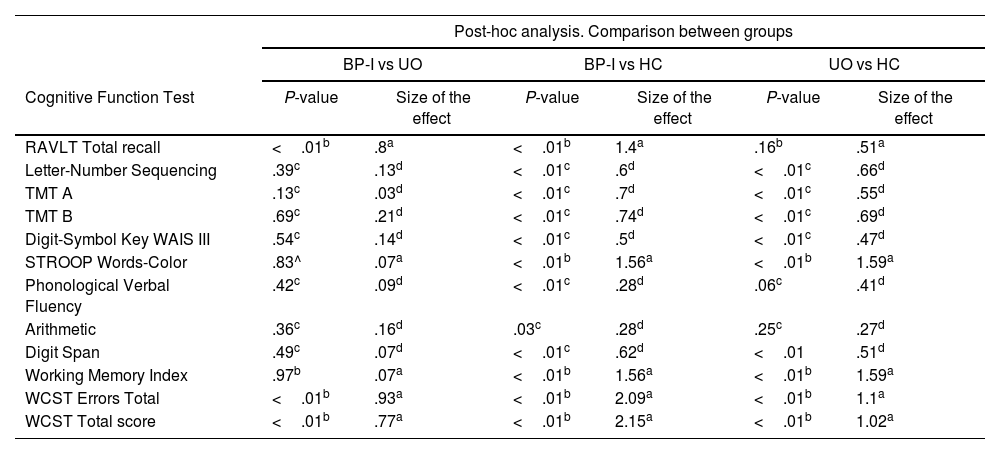Patients with bipolar disorder type I (BP-I) often present with impairments in cognitive function. Offspring unaffected by the disorder can also present with cognitive dysfunction. The objective of this study was to compare the cognitive function of BP-I patients, their unaffected offspring (UO) and healthy control subjects (HC).
MethodsVerbal memory, working memory index, processing speed, attention, verbal and phonological fluency and executive function were evaluated through the application of a neuropsychological battery to three groups made up of BP-I patients that attended the Bipolar Disorder Outpatient Clinic of Clínica San Juan de Dios de Manizales [San Juan de Dios de Manizales Clinic] (n=30), UO (n=32) and control group (n=31). The UO group and the control group were matched by gender, age and level of education.
ResultsMajor differences between the three groups were found in the measures of cognitive functions (except in semantic fluency). The HC group showed better cognitive performance in all the functions. Post-hoc analysis showed similar results in the cognitive performance between BP-I and UO except in verbal learning and executive function tasks where the results were better in UO. A better performance in the control group was found, compared to the UO group, in executive function, attention, working memory, and semantic fluency and phonological areas.
ConclusionsThese results indicate that the offspring of patients with BP-I present with cognitive impairments without suffering from the disorder. This suggests that cognitive dysfunction presents without diagnosis and supports the hypothesis that it can correspond to a BP-I endophenotype.
Los pacientes con trastorno bipolar tipo I (TB-I) presentan con frecuencia alteraciones en las funciones cognitivas. Los hijos no afectados por el trastorno pueden presentar déficits cognitivos. El objetivo del presente estudio es comparar las funciones cognitivas en pacientes con TB-I, sus hijos no afectados (UO) y controles sanos (HC).
MétodosSe evaluó la memoria verbal, el índice de la memoria de trabajo, velocidad de procesamiento, atención, fluidez verbal y fonológica y función ejecutiva mediante la aplicación de una batería neuropsicológica a 3 grupos conformados por pacientes con TB-I asistentes a la Clínica Ambulatoria de Trastorno Bipolar de la Clínica San Juan de Dios de Manizales (n=30), UO (n=32) y HC (n=31). Los grupos de UO y HC se emparejaron por sexo, edad y escolaridad.
ResultadosSe encontraron diferencias significativas entre los 3 grupos en las medidas de sus funciones cognitivas, excepto en la fluidez semántica. El grupo de HC mostró mejor rendimiento cognitivo en todas las funciones. El análisis post hoc mostró resultados similares en el funcionamiento cognitivo entre TB-I y UO excepto en las pruebas de aprendizaje verbal y función ejecutiva, donde los resultados fueron mejores en los UO. Al comparar los grupos de HC y UO, se encontró un mejor rendimiento del primero en función ejecutiva, atención, índice de memoria de trabajo y fluidez semántica y fonológica.
ConclusionesEstos resultados indican que los hijos de pacientes con TB-I presentan alteraciones cognitivas sin padecer el trastorno. Esto indica que las alteraciones cognitivas se manifiestan sin que haya diagnóstico y robustece la hipótesis de que puedan corresponder a un endofenotipo del TB-I.








